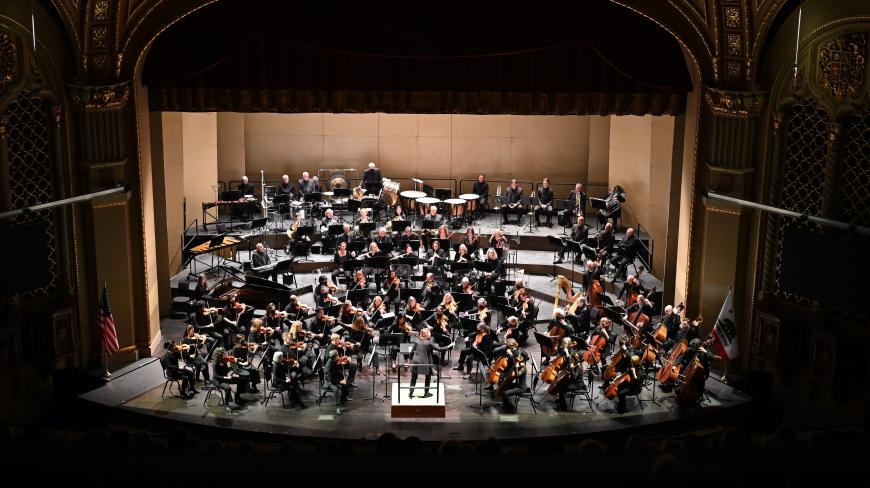
At Symphony San Jose’s opening concert of the 2023–2024 season, it was obvious that a new broom was sweeping through the orchestra, though the musicians and the high quality of their performance were much the same as in previous seasons.
The broom belongs to General Director Robert Massey. This is his second year on the job but the first for which he’s responsible for programming. He’s made a number of noteworthy changes in the orchestra’s practice.
First, evening concerts are beginning at 7:30 p.m. instead of 8 p.m. Second, the screens by the side of the stage, which for two years have accompanied the music with distracting close-up video of what attendees can already see live right in front of them, are now mercifully off while the music is playing.

And third, in place of the Symphony’s recent custom of attempting a crowd-pleasing blockbuster at each concert, Massey has programmed this entire season with works that SSJ has never performed before. Of course, with an orchestra that’s only 22 years old and that plays (at present) just seven formal masterworks concerts a season, there’s still room for previously unplayed crowd-pleasers, and this season will conclude with Gustav Mahler’s First Symphony and Mozart’s “Elvira Madigan” Concerto.
But Saturday’s concert at the California Theatre contained two less-often-played works by popular masters, plus one contemporary work, a realm of music that SSJ has been conscientiously making room for. This program had a theme: narratives of musical storytelling. There were excerpts from Sergei Prokofiev’s ballet Cinderella, Richard Wagner’s “Prelude und Liebestod” from his opera Tristan und Isolde, and Lera Auerbach’s Icarus, inspired by a Greek myth.
With expansive and energetic gestures, first-time guest conductor Lidiya Yankovskaya led a performance that was pleasant and well crafted rather than compelling. The playing by all the musicians was consistently exquisite, which should only be a surprise to listeners who haven’t been paying much attention to SSJ recently. It’s a fine orchestra and is getting better all the time. Occasional roughness has virtually vanished, an achievement even more impressive in the first concert after a summer break. Yet while the music made for good listening, it lacked a degree of emotional effectiveness.
Yankovskaya may have deliberately tamped down on the emotional intensity. Her Wagner was as lean and sinewy as this inherently lush music can get. The emphasis was on the melodic line and on keeping a careful balance between strings and winds. The string lines were of remarkable lightness and clarity, and even the climax was light and airy. This Isolde sings (figuratively), but it’s hard to picture her dying of grief or having a final ecstatic vision of Tristan.
Cinderella was played in a similar vein, coming out light and chirpy. This Prokofiev ballet is less popular than his Romeo and Juliet, but there’s no reason it should be. It takes Romeo’s dance proclivity much further and mixes this with the whirring and crafty idiom of the composer’s contemporaneous Fifth Symphony. There are a couple of waltzes which brilliantly display Prokofiev’s ability to write angular and jerky melodic lines which are nevertheless catchy and memorable tunes.

Still, this suite — Yankovskaya’s choice of 10 movements from the collected original suites — seemed to wear thin after a while, running on longer than was welcome without also having dancers to watch. The climax, where the clock strikes midnight and Cinderella has to dash from the ball, missed the corrosive excitement this music can carry.
Auerbach’s Icarus is one of the most impressive works by a highly variable composer. It doesn’t attempt to tell the story of Icarus’s disastrous attempt at human flight but just to evoke the image. It’s light-toned and brittle, full of chimes and clipped sounds, with surges of sudden change in emotional character.
It’s not, however, tuneful in the traditional manner. Judging from the amount of mumbling and chattering going on among the audience members around and behind me, it was not holding their interest. This was unfortunate because, by the standards of contemporary music, it was strikingly effective.
Later concerts this season will feature new music by Adam Schoenberg — who has been successful here before — Caroline Shaw, and even Danny Elfman. Perhaps they will earn silence from their listeners.




